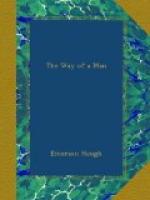This was my first acquaintance with Gordon Orme, that strange personality with whom I was later to have much to do. This was my first witnessing of that half uncanny power by which he seemed to win all things to his purposes. I admired him, yet did not like him, when he swung carelessly down and handed me the reins.
“He’s a grand one,” he said easily, “but not so difficult to ride as old Klingwalla. Not that I would discount your own skill in riding him, sir, for I doubt not you have taken a lot out of him before now.”
At least this was generous, and as I later learned, it was like him to give full credit to the performance of any able adversary.
CHAPTER III
THE ART OF THE ORIENT
“Come,” said Orme to me, “let us go into the shade, for I find your Virginia morning warm.”
We stepped over to the gallery of the little tavern, where the shade was deep and the chairs were wide and the honeysuckles sweet. I threw myself rather discontentedly into a chair. Orme seated himself quietly in another, his slender legs crossed easily, his hands meeting above his elbows supported on the chair rails, as he gazed somewhat meditatively at his finger tips.
“So you did not hear my little effort the other night?” he remarked, smiling.
“I was not so fortunate as to hear you speak. But I will only say I will back you against any minister of the gospel I ever knew when it comes to riding horses.”
“Oh, well,” he deprecated, “I’m just passing through on my way to Albemarle County across the mountains. You couldn’t blame me for wanting something to do—speaking or riding, or what not. One must be occupied, you know. But shall we not have them bring us one of these juleps of the country? I find them most agreeable, I declare.”
I did not criticise his conduct as a wearer of the cloth, but declined his hospitality on the ground that it was early in the day for me. He urged me so little and was so much the gentleman that I explained.
“Awhile ago,” I said, “my father came to me and said, ’I see, Jack, that thee is trying to do three things—to farm, hunt foxes, and drink juleps. Does thee think thee can handle all three of these activities in combination?’ You see, my mother is a Quakeress, and when my father wished to reprove me he uses the plain speech. Well, sir, I thought it over, and for the most part I dropped the other two, and took up more farming.”
“Your father is Mr. John Cowles, of Cowles’ Farms?”
“The same.”
“No doubt your family know every one in this part of the country?”
“Oh, yes, very well.”
“These are troublous times,” he ventured, after a time. “I mean in regard to this talk of secession of the Southern States.”
I was studying this man. What was he doing here in our quiet country community? What was his errand? What business had a julep-drinking, horse-riding parson speaking in a Virginia pulpit where only the gospel was known, and that from exponents worth the name?




